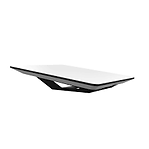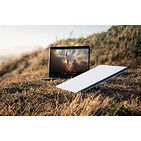Internet for Today's RV
RV internet access is very important due to many systems like Solar, Electrical, Electronics and even RV Security is becoming more prevalent in RV's today, and having good internet service and wifi are almost always necessary.
Many full timers want full time access, and even part-time RV'er want to be online, search the web and send email.
Technological advances provide more choices for RV'er internet access and the following are the solutions that we at Infinite RV & Marine recommend from the Most desirable and most consistent available today to the least while traveling in your RV and while at either park locations or rural.
1. Starlink Satellite Internet & Wifi
A way to have RV internet access is the use of a satellite system such as Starlink which provides amazingly fast and reliable internet almost anywhere you go. Starlink with Portability gives you internet at home and on a roaming basis, where at-home internet speeds are prioritized, and roaming speeds are a 'best effort' service. Starlink for RV doesn't require you to update your service address, so you can use it on the move.
Pros and Cons:
Starlink internet has many pros and cons, including:
-
Pros
-
Easy to install: Starlink is easy to install, requiring only plugging in the router and dish.
-
Fast speeds: Starlink offers some of the fastest speeds of any satellite internet provider.
-
Unlimited data: Starlink offers unlimited data.
-
Low latency: Starlink has low latency.
-
No contracts: Starlink doesn't have contracts. Turn off or Pause your service anytime.
-
Good for rural areas: Starlink is a good option for people in rural areas or who need a connection while traveling
-
-
Cons
-
Expensive: Starlink equipment and service fees can be expensive.
-
Slower than cable or fiber: Starlink is slower than cable or fiber internet.
-
Vulnerable to bad weather: Starlink can be affected by bad weather.
-
Requires clear view of the sky: Starlink requires a clear view of the sky, so it may not work well in areas with lots of trees or buildings.
-
Draws a lot of power: Starlink can draw a lot of power.
-
Not ideal for high-density areas: Starlink may not be a good solution for high-density urban areas.
-
May not react well to quick power interruptions: Starlink may not react well to quick power interruptions.
-
Starlink is available in several models which allows you to use your system in many productive ways. The models available today include the Generation 2, Generation 3, High Performance and the new Starlink Mini.
2. Wireless (Cellular ) RV Internet Access
Full timers or “most-timers” are seeking a 24/7 internet access connection (or as close to 24/7 as they can get). They want RV connectivity at any location they travel to. They want access when they are boon docking or in remote locations.
They need to send email, do their online banking, look up directions and do the usual web browsing. Ideally, they would like to be online while going down the road.
One way to go is to use a cellular wireless provider for Hotspot internet access which is combined with great products such as Peplink/Pepwave and when combined provide extremely high speed internet where ever cellular service is available. Wireless providers include companies like Verizon, Sprint, AT&T, T-Mobile, etc.
If you live in your RV full time, you want a reliable internet connection like portable 4G internet. It's more expensive than 4G home internet plans, but it gives you similar speeds and reliability while allowing you to take your Wi-Fi with you wherever you go.
As a Peplink Certified Dealer and Installer, we have found that their routers are a popular choice for RVers because they offer reliable internet connectivity, a variety of features, and community support:
-
Bonding technology
Peplink routers can combine multiple network connections, like cellular, Wi-Fi, and Starlink, to improve performance and reliability.
-
Redundancy
Peplink routers can create a redundant mobile internet setup by combining multiple internet sources.
-
Community support
Peplink offers resources and community support to help users navigate RV internet.
-
Mobile internet antennas
Peplink's Mobility antenna series is designed to provide a steady connection for mobile deployments like camping or road trips.
-
Consumer-level options
Peplink offers a range of products, from budget mobile routers to weatherproof rooftop cellular modems.
-
Synergy Mode
Peplink Synergy Mode allows users to control multiple Peplink modems and routers through a single dashboard.
Some Peplink products for RVs include:
-
MAX Transit Duo: Has dual embedded cellular modems, two SIM slots, and Hot Failover technology
-
B One 5G: Compatible with Peplink Synergy Mode, allowing users to control other Peplink devices through a single dashboard
-
MAX BR1 Mini & BR2: Budget mobile routers for basic connectivity
-
MAX HD1 Dome & Dome Pro LR: Weatherproof rooftop cellular modems for high-end applications
Most of the wireless providers have plans and devices that allow you to add an additional line to your current cellular data plan which allows for an inexpensive solution and which comes with options for the amount of data usage with many offering unlimited data packages. These are generally high speed connections. AT&T, Verizon and Sprint have a dedicated cellular phone line for this type of usage for about $20-30/month depending on your provides pricing.
3. Cable RV Internet Park Access
In the past, the most basic approach to RV internet access was to just plug in to a dial-up modem at a campground. Many campgrounds had at least one connection in their parks. The main disadvantages of this method are slow speeds, having to trek to the campground office or
wherever the connection is located, waiting your turn or having to limit your time to give another camper their turn. In the past, this was about the only way to get RV internet access, but in the current web-based world, it does not meet the needs of most RV'er.
Sometimes campgrounds offer phone or cable connections for RV internet access at the individual sites. Usually the visiting RV'er needs to activate these connections by calling the phone or cable company. For the RV'er who is going to be staying awhile, this can be a good means of high speed RV internet access via broadband or DSL connections. But for the visitor on the move who only spends a few days or weeks in a given spot, this is usually not a viable means for internet access on the road.
4. WiFi RV Internet Access from the Park
Wi-Fi is a big improvement for getting RV internet access. A computer with an 802.11 (Wi-Fi) card or adapter should get you online in the comfort of your own RV.
More and more parks are installing WiFi networks. The RV'er connects to the park’s wireless “hotspot”, much like the hotspots now found in many locations across the country – in airports, truck stops, coffee shops like Starbucks, convenience stores, restaurants and so on.
WiFi data speeds are much improved over dial-up. The speed and range of the reach will vary depending on the specific WiFi network and configuration at a given park. We have been fortunate to find some very fast access, but have also used WiFI connections that are just so-so.
Also be aware if a park does offer WiFi RV internet access – you may not be able to access the network from all sites in the campground, so ask when you make the reservation or check in.









